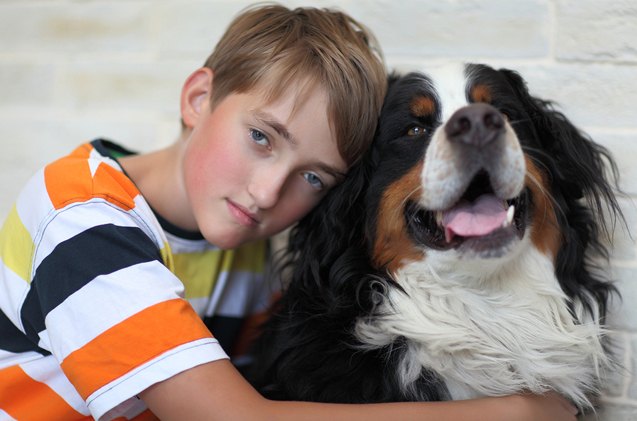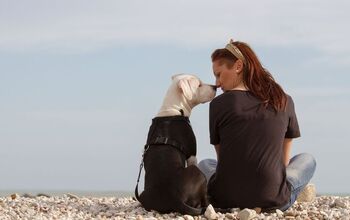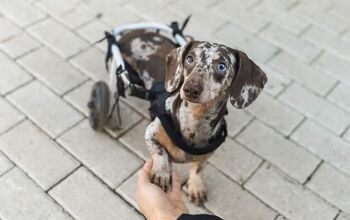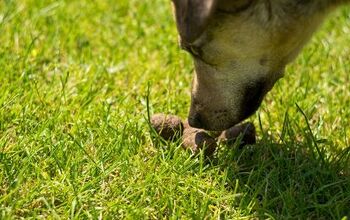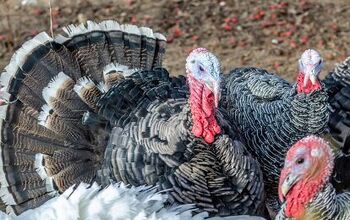Lost Dog Advice: How To Help Kids Cope When Your Dog Goes Missing

When your child’s hamster dies or you find his fish floating upside down in the tank, you may develop an elaborate story to explain what happened. Losing a pet can be confusing for a child, especially if it is a family pet like a dog. Depending on your child’s age, he may not understand why your dog would leave home – and there are a lot of emotions that may accompany. If your child feels any quilt about your dog getting lost (for instance if they let them out accidentally or dropped the leash). That’s why it’s important to talk about a few valuable tips for helping your child cope with a lost dog.
Related: Why A Lost Dog’s Behavior Impacts Why And Where He Roams
When Your Dog Is Not Lost: What NOT To Do
When you notice that your dog is missing, your first instinct might be to panic. For the sake of your children, however, you should bite back this reaction. If you panic, your children might become afraid as well and you may have to spend valuable time consoling them when they could be helping you look for the dog.
As well, you should avoid making promises that your dog will come back. You may not know the circumstance behind the disappearance and there is no guarantee that you will get your dog back. Dog theft is a growing problem and if someone steals your dog to make a profit, he will probably be gone before you even know he is missing. Avoid the temptation to tell your child that the dog simply went for a walk – it is always better to tell the truth. Do not use the term “ran away,” however, because this terminology can be frightening and confusing for young children. You also need to be careful about assigning blame. If your child left the gate open you can explain to him what happened to keep it from happening again, but do not blame him for the dog’s disappearance.
Related: What To Do If Your Dog Gets Lost
When Your Dog Is Lost: What You SHOULD Do
In addition to addressing any factors that may have contributed to your dog’s escape (like leaving the gate open), you should make every effort to find the dog. Show your children that you care about the dog as you would any other family member and that you will do whatever it takes to find him. Let your children see you making calls to animal shelters and putting up flyers – you can also involve them in performing a search of the neighborhood. Allowing your children to help make “lost dog” flyers can help them to feel more in control and less frightened of the situation. If your dog remains missing for more than a day, you may want to let your child’s teacher or daycare provider know what is going on in case your child needs a little extra reassurance when you are not there to give it.
Additionally, you’ll want to do the following throughout the process (including if the dog is never found, or found dead):
- Remember To Stay Calm. This is hard because you probably are freaking out and missing your furry child too. Dogs are part of the family–important parts, and if your initial efforts to find your missing dog don’t pan out, you may start to look nervous and worried. Kids do pick up on that, so do your best to keep your cool.
- Tell Them The Truth Every Step. Kids are smart and like we said, they pick up on stuff. You don’t want to tell them fibs about the dog going for an adventure or whatever you think may make them feel like it was the dog’s choice to be apart, because then they may be confused. Each step of the process needs to have truth, even if it means telling your child you’re afraid they may never find the dog.
- Don’t Dismiss Their Feelings Or Their Ideas. They may be full of ‘ideas’ that they think may help bring their family member home. They’ll likely be ideas that won’t necessarily work and could even take time you feel you don’t have. Try not to dismiss their ideas. Remember, getting them involved in the process can help them feel less anxious and more a part of the process.
- Give Some Grace For Extra Emotions And Behaviors. Kids don’t have fully developed prefrontal cortexes. This means the part of their brain that regulates emotions and impulse control and quick emotions is just not developed. So while you may be going out of your mind with worry, you’re an adult and you can keep it together better. Kids may not be able to, so if you see erratic behaviors or breakdowns, it could simply be them worrying and their anxiety manifesting in temper tantrums and emotional fits. Try to remember that this isn’t personal; it’s worry-driven, and you can understand that.
What Happens if You Don’t Find the Dog?
If you never end up finding your dog, your child may be traumatized by the experience, perhaps even blaming themselves for the loss. Your child may develop a wide range of emotions including sadness and guilt, even anger at friends who still have their pets. Time is the only thing that will really heal your child’s wounds, but there are a few activities you can use to help your child process his emotions regarding the loss of your dog:
- Have your child draw a picture of your dog or write him a letter
- Consider holding a memorial service for your dog so your child can say goodbye
- Let your child keep something that was meaningful to the pet, like a favorite toy
- Give your child chances to talk about their feelings and make sure they feel validated
- Consider buying books that help kids to work through their emotions. There are so many beautiful books that you can read with children to help them know they’re not alone and that there are some others who have gone through pet loss. Showing them how this looks for others may even help them process and work through on their own. This article has several amazing books for kids of all ages.
Losing a dog is never easy, but it can be especially traumatizing for children. By working through this, as a family, both parents and children will be better equipped to handle the situation and its after-effects. Remind your children that your pet will always be a beloved family member, and even if in the future you decide to get another pet, he’ll never be replaced.

Kate Barrington is the loving owner of two cats (Bagel and Munchkin) and a noisy herd of guinea pigs. Having grown up with golden retrievers, Kate has a great deal of experience with dogs but labels herself a lover of all pets. Having received a Bachelor's degree in English, Kate has combined her love for pets and her passion for writing to create her own freelance writing business, specializing in the pet niche.
More by Kate Barrington



